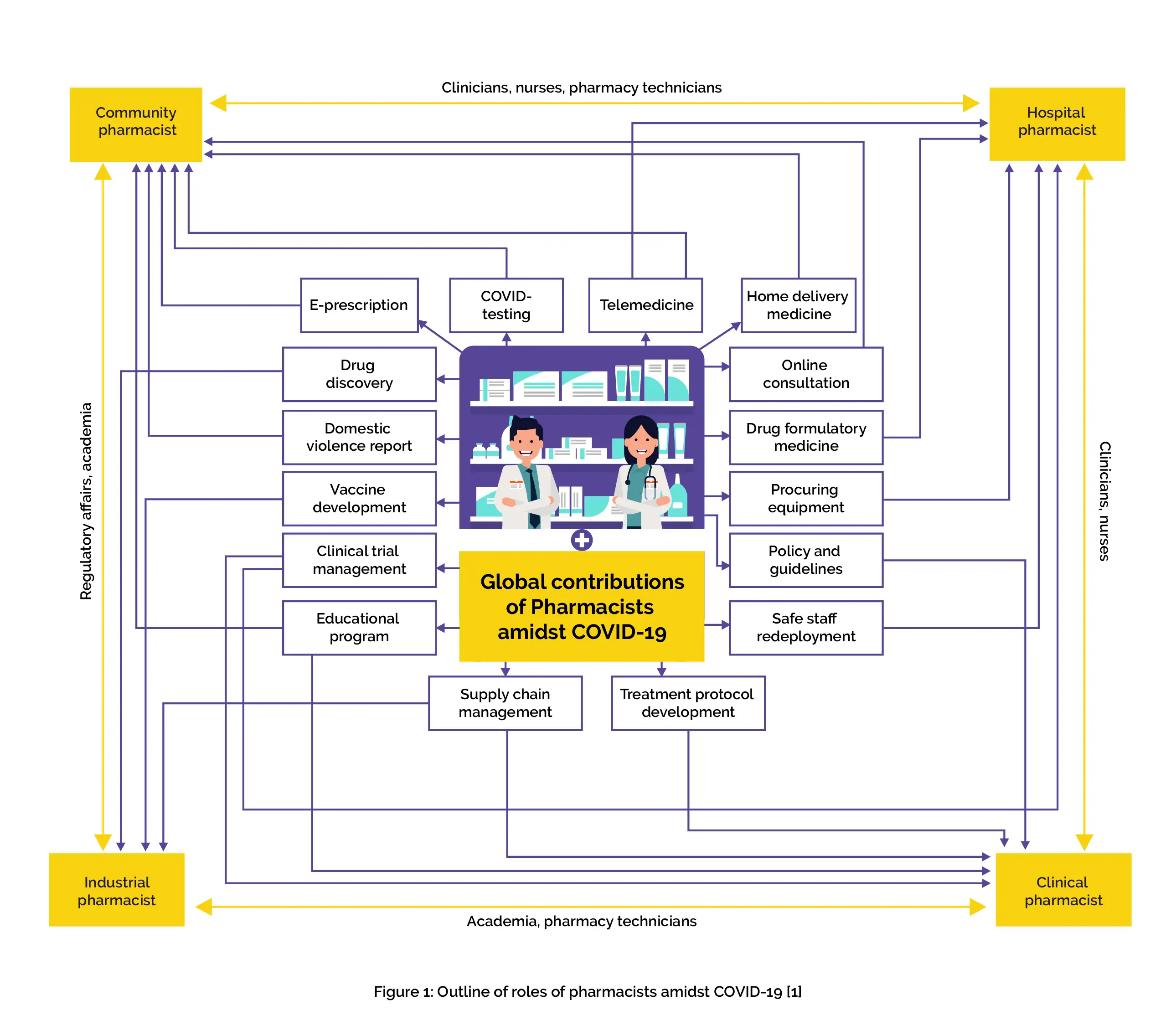Categories
Change Password!
Reset Password!


In the last few decades, the world has witnessed several outbreaks of life-threatening viral infections caused by a range of pathogenic organisms such as Influenza, Chikungunya, MERS (Middle East respiratory syndrome), SARS (severe acute respiratory syndrome), and Ebola. [1] COVID-19, a respiratory tract infection, caused by the Severe Acute Respiratory Syndrome Coronavirus 2 (SARS-CoV-2), first came out in December 2019 in Wuhan and started to spread rapidly across the globe. World Health Organization (WHO) announced COVID-19 a pandemic on 11th March 2020. [2]
Emergence of novel variants of coronavirus is an affirmation of a harsh reality that the world should be ready for such frequent outbreaks in the future. The multiple COVID-19 outbursts have impacted millions of people and resulted in a global health crisis. The world needs to be more prepared to defeat the ever-evolving viral paths, and pharmacists play the most crucial role in the mediation of this journey by boosting our defenses against deadly outbreaks. [3]

As healthcare professionals, pharmacists have shouldered great responsibility and have worked diligently to limit the spread of infection. [3] From the role of dispensing medicines to becoming significant medical care stakeholders in patient-centered care, an extensive range of new responsibilities of pharmacists have evolved promptly during the pandemic situation. [4]
Pharmacists have always been the most accessible medical care provider that stepped up to take on additional responsibilities, especially in the SARS-CoV-2 era. However, recognition of their efforts has been inconsistent at all levels. [5] This article highlights the promising roles and responsibilities of pharmacists during the COVID-19 pandemic.
Pharmacists: Roles and Responsibilities during COVID-19
COVID-19 has not only adversely affected the world medical care system, but it has also brought out innovative roles for healthcare personnel to cater to growing needs. [4] Frontline healthcare professionals have been crucial to keep the pandemic at bay. As frontline fighters, pharmacists have played a significant role in adopting innovative strategies to reduce the adverse impact of the SARS-CoV-2 outbreak.[2]

Being drug-expert, pharmacists’ involvement in the frontline medical care team has improved the overall capacity of team to fight against this terrible threat to global human health. [6] During unprecedented COVID-19 outbreaks, community pharmacies continued to be open to the public in spite of strict lockdown constraints. Pharmacists offered direct patient care and executed frontline responsibilities in infection control as well as patient care and support. [7] Figure 1 outlines the role of pharmacists during coronavirus pandemic. [3]

The coronavirus outbreak elicited a gross imbalance between supply and demand of drugs. Pharmacists ensured a smooth flow of drug-supply chain. [4] They ascertained adequate medication supply to assist ICU beds while monitoring and resolving critical drug shortage issues by implementing sourcing alternatives and conservation strategies. [4,8] Access to medical care was a significant challenge due to paucity of public transportation during lockdown. [9] Despite restrictions imposed by government, pharmacists provided quality pharmaceutical care to COVID-19 patients. [5]
Non-routinely stocked drugs were offered for patients with chronic conditions in order to evade repeated visits. [9,10] Along with respiratory therapists, paramedics, nurses, and doctors, pharmacists contribute to SARS-CoV-2 management protocols by taking part in inpatient rounds. They also helped with recruitment of infected patients for trials investigating potential treatment options for COVID-19. Other roles encompassed antimicrobial stewardship, development of therapy protocols, and guiding choice of treatment drugs. They eased patient's distress by offering triaging and basic consultations via telemedicine, and also minimized the burden on doctors and healthcare system. [5]
They actively provided counselling on appropriate usage of novel therapeutic drugs for COVID, including off-label use. They minimized the medical care systems' burden by diverting the patient's rush away from hospitals by screening and triaging patients. Pharmacists contributed to SARS-CoV-2 screening, clarified misconceptions and myths about coronavirus interventions, identified adverse drug reactions, evaluated individuals for renewal of chronic medications, and educated patients on telehealth services.
They also aided in interpretation of test results for SARS-CoV-2, and exploration of novel drug therapies or uses. [5] They provided reliable information to prevent, detect, treat and manage COVID-19 and assisted in developing emergency drug formulations along with coordinating with manufacturers to ensure availability and stable supply of medicines. [2, 11] They played a pivotal role in distribution of vaccines and surgical masks during crisis, contributed to small-scale manufacturing of sanitizers and disinfectants, provided home delivery of medications, and reduced undue hospital visits. [1, 8, 11]
Conclusion

The continuously escalating burden of coronavirus disease has significantly challenged the medical care system around the globe. [12] In the fight against this deadly disease, our shield is the medical care system and our soldiers are the medical care professionals that undoubtedly include pharmacists. [5] Pharmacists are frontline warriors offering patient care in a range of settings such as national and public health, physician offices, community pharmacies, long-term care, clinics, and hospitals. [9]
Throughout the epidemic, pharmacists have played a significant role in several fields like assessment of lab reports, monitoring of drug shortages, evaluation of patients, development of hygiene and therapeutic protocols, research of novel drugs, vaccine development, and providing relevant medication advice to patients. It is pivotal that pharmacists remain updated and assist as safeguards for the public by taking up critical challenges as the situation demands. [3]
The role of pharmacists has substantially expanded after the coronavirus outbreak, and they have moved on from simply dispensing medicines to becoming more crucial key stakeholders in the medical care system. Pharmacists should be facilitated to adapt to these new roles. This may prove beneficial in attaining mass immunization and enhancing health care in a post-COVID world. [4]
Pharmacists are frontline healthcare professionals and they must be given the appreciation deserved by them. [5] More suitable models must be designed by academics, regulatory affairs, and policy-makers to utilize their skills and improve the flow of work in patient care facilities. [1] Their medication expertise must be leveraged in clinical trials and vaccine development. [5] They must collaborate with other medical care professionals to further address the challenges of post-pandemic circumstances.[1]
References
Comments (0)